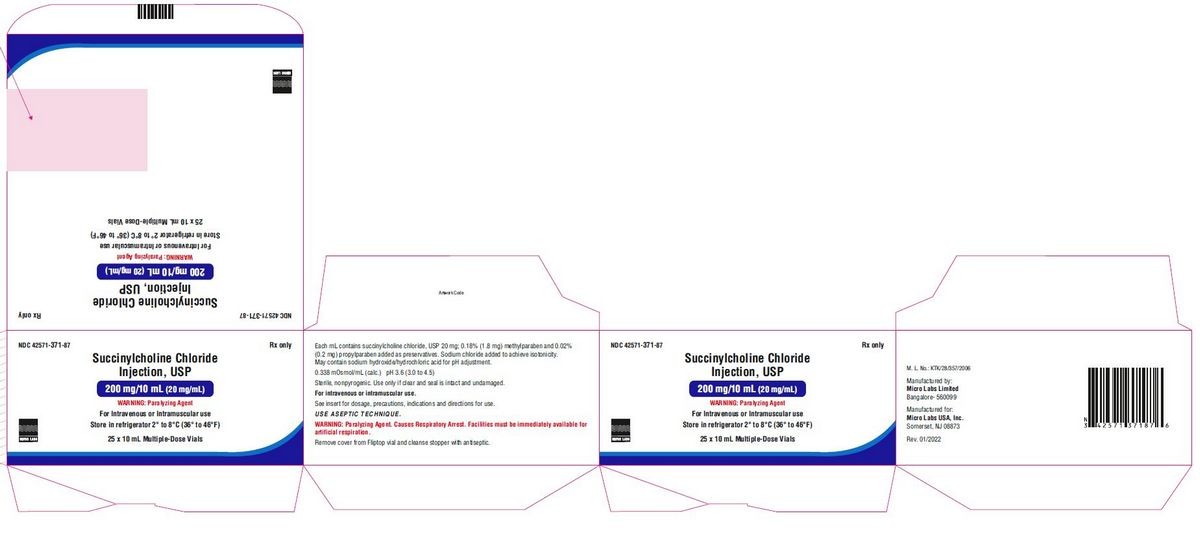
Contents
succinylcholine
Succinylcholine is a skeletal muscle relaxant used during medical procedures under general anesthesia, including tracheal intubation, mechanical ventilation, and surgeries. Succinylcholine belongs to the class of depolarizing neuromuscular blockers. It temporarily paralyzes skeletal muscles, preventing contraction and movement during medical procedures.
Succinylcholine works by blocking acetylcholine, the neurotransmitter that nerve cells release at the neuromuscular junction to make muscles contract. The neuromuscular junction, also known as the motor end plate, is the site of communication between a nerve fiber and a muscle cell.
Succinylcholine binds to acetylcholine receptors in the motor end plate and depolarizes muscle fiber membranes, generating an action potential. It prevents further neurotransmission by binding to the receptors, leading to muscle paralysis. The initial depolarization causes muscle twitches before progressive muscle paralysis occurs, starting with the face, glottis, rib muscles, diaphragm, and eventually all skeletal muscles.
Succinylcholine’s effects are rapid, causing paralysis within 60 seconds. A single intravenous administration lasts for 4-6 minutes, making it useful for short procedures. It has no effects on consciousness or pain and is used alongside anesthetic and analgesic drugs during general anesthesia.
Succinylcholine has no direct effect on smooth muscles and cardiac muscles. However, it can disturb heart rhythm by stimulating the autonomous nervous system. Depolarization also causes an influx of sodium ions into muscle cells and the release of potassium ions. This can result in irregular heart rhythm (dysthymia) or cardiac arrest, especially in individuals with certain muscle diseases or pre-existing high potassium levels (hyperkalemia).
Warnings
- Succinylcholine should be administered only by skilled medical personnel with access to artificial respiration management and instant tracheal intubation and ventilation facilities.
- Do not administer succinylcholine before inducing unconsciousness, except in emergency situations, as it may cause distress to the patient.
- Do not administer succinylcholine to patients with:
- Known hypersensitivity to succinylcholine or any of its components
- Skeletal muscle diseases (myopathies) with elevated serum creatine kinase
- Dangerously high temperature (malignant hyperthermia) or a history of malignant hyperthermia
- If a healthy child develops cardiac arrest after receiving succinylcholine without any apparent reason, immediate treatment for hyperkalemia and hyperthermia should be initiated.
- Use succinylcholine in pediatric patients only for emergency intubation or when immediate airway securing is necessary, as there may be no signs or symptoms to identify which patients are at risk.
- Avoid use in patients with electrolyte imbalances or massive digitalis toxicity, during the acute phase of injury from major burns, multiple trauma, extensive denervation of skeletal muscle or upper motor neuron injury, chronic abdominal infection, subarachnoid hemorrhage, degenerative or dystrophic neuromuscular disease, or conditions that may cause degeneration of the central and peripheral nervous systems.
- Closely monitor patients for the development of malignant hyperthermia.
- In case of the first sign of malignant hyperthermia, discontinue anesthesia and provide appropriate treatment.
What are the side effects of succinylcholine?
Common side effects of succinylcholine include:
- Postoperative muscle pain
- Jaw rigidity
- Muscle twitch (fasciculation)
- Respiratory depression
- Cessation of breathing (apnea)
- Low or high blood pressure (hypotension or hypertension)
- Irregular heart rhythms (cardiac arrhythmias)
- Slow or rapid heartbeat (bradycardia or tachycardia)
- Cardiac arrest
- Increase in intraocular pressure (IOP)
- High blood potassium levels (hyperkalemia)
- Severe life-threatening drug reaction with excessively high temperature (malignant hyperthermia)
- Salivary gland enlargement
- Excessive salivation
- Rash
- Hypersensitivity reactions
- Severe allergic reaction (anaphylaxis)
- Breakdown of muscle tissue (rhabdomyolysis)
- High blood level of myoglobin, a type of muscle protein (myoglobinemia)
- High myoglobin level in the urine (myoglobinuria)
- Acute kidney failure due to myoglobinuria
This is not a complete list of all side effects or adverse reactions that may occur from the use of this drug.
Call your doctor for medical advice about serious side effects or adverse reactions. You may also report side effects or health problems to the FDA at 1-800-FDA-1088.
What are the dosages of succinylcholine?
Injectable solution
Neuromuscular blockade
Adult:
- 0.3-1.1 mg/kg IV for 1 dose, OR
- 3-4 mg/kg IM for 1 dose
- Short Procedures: usually 0.6 mg/kg IV injection
Maintenance for Prolonged Procedures
- 0.04-0.07 mg/kg IV every 5-10 minutes as needed OR
- 2.5 mg/min IV infusion
Pediatric:
- Infants and small children: 2 mg/kg IV for 1 dose
- Older children and adolescents: 1 mg/kg IV for 1 dose
- 3-4 mg/kg deep IM for 1 dose; not to exceed 150 mg total dose (no adequate IV)
- 0.3-0.6 mg/kg IV every 5-10 minutes as needed
Dosage considerations
- The solution contains 1% benzyl alcohol
- Prior administration of a "defasciculating" dose of nondepolarizing neuromuscular blocker (such as 0.01 mg/kg IV vecuronium) will prevent muscular fasciculations that may increase intracranial pressure/intraocular pressure (ICP/IOP)
- Adequate ventilatory support is mandatory, and patients may experience increased sensitivity with electrolyte disorders (hypermagnesemia, hypokalemia, hypocalcemia)
Administration
- The dose should be calculated based on ideal body weight
- For intravenous or intramuscular use only
Overdose
- Succinylcholine overdose may lead to a longer-than-required neuromuscular block for surgery and anesthesia.
- Symptoms include skeletal muscle weakness, decreased respiratory reserve, low tidal volume, or cessation of breathing.
- Treatment includes maintaining a patent airway and providing respiratory support until normal respiration is restored.
What drugs interact with succinylcholine?
Inform your doctor of all medications you are currently taking, who can advise you on any possible drug interactions. Never begin taking, suddenly discontinue, or change the dosage of any medication without your doctor’s recommendation.
- Succinylcholine has no known severe interactions with other drugs.
- Succinylcholine has serious interactions with at least 28 different drugs.
- Succinylcholine has moderate interactions with at least 182 different drugs.
- Succinylcholine has mild interactions with at least 49 different drugs.
The drug interactions listed above are not all of the possible interactions or adverse effects. For more information on drug interactions, visit the RxList Drug Interaction Checker.
Always inform your doctor, pharmacist, or healthcare provider of all prescription and over-the-counter medications you use, along with the dosage for each, and keep a list of this information. If you have any questions about the medication, consult your doctor or healthcare provider.
Pregnancy and breastfeeding
- There are no studies on succinylcholine’s use during pregnancy, and it is not known if it can cause fetal harm. Use only if clearly needed and if the benefits outweigh potential risks.
- It is not known if succinylcholine is excreted in human milk. Use caution following succinylcholine administration to a nursing mother.
By clicking Submit, I agree to the MedicineNet’s Terms & Conditions & Privacy Policy and understand that I may opt out of MedicineNet’s subscriptions at any time.
Summary
Succinylcholine is a skeletal muscle relaxant used for medical procedures performed under general anesthesia, including tracheal intubation, mechanical ventilation, and surgeries. Common side effects of succinylcholine include postoperative muscle pain, jaw rigidity, muscle twitch, respiratory depression, cessation of breathing, low or high blood pressure, irregular heart rhythms, slow or rapid heartbeat, cardiac arrest, increase in intraocular pressure, high blood potassium levels, severe life-threatening drug reaction with excessively high temperature, salivary gland enlargement, excessive salivation, rash, hypersensitivity reactions, and others.


